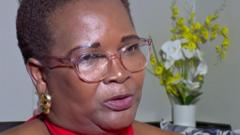The Thirlwall Inquiry, now in its eleventh week, is investigating how Lucy Letby was able to murder seven babies and attempt to murder seven more at the Countess of Chester Hospital in 2015 and 2016. The inquiry is focused on understanding how concerns were handled on the ward and determining accountability, rather than revisiting Letby’s guilt.
This week was particularly significant as key hospital executives spoke publicly for the first time. The former directors – Alison Kelly (nursing), Ian Harvey (medical), Sue Hodkinson (HR), and Tony Chambers (chief executive) – all appeared before the inquiry, offering new insights into the hospital’s handling of the case.
Each executive began by apologizing to the victims’ families. They seemed carefully measured in their statements, potentially mindful of an ongoing Cheshire Police investigation into potential corporate manslaughter.
The testimony revealed several critical points:
1. Communication Failures: The executives acknowledged poor communication with both the babies’ families and the medical staff who raised initial concerns about Letby.
2. Delayed Response: Months passed between doctors first raising concerns and Letby being removed from duty, and nearly another year before police were involved.
3. Personal Interactions with Letby: Tony Chambers met with Letby and her parents in December 2017, telling her “don’t worry Lucy we’ve got your back” after her grievance complaint was upheld.
4. Parental Pressure: Letby’s father was described as making aggressive phone calls and threatening hospital staff, including allegedly threatening “guns to my head.”
5. Workplace Culture: The executives were questioned about the hospital’s internal culture. Alison Kelly admitted to acrimony between doctors suspicious of Letby and nurses who supported her, though she denied creating a “culture of fear.”
The executives struggled to take personal responsibility. When pressed about his failings, Chambers initially used collective language before acknowledging his role as the “accountable officer.”
Medical director Ian Harvey admitted sending an “inappropriate and insensitive” letter to families and acknowledged that information wasn’t shared openly enough, though he denied any cover-up.
The inquiry also highlighted the lack of support for NHS whistleblowers, with consultants who raised concerns feeling unsupported and potentially intimidated.
While the executives attempted to balance their duty of candour with a perceived duty of care to Letby, their testimony raised more questions about the hospital’s decision-making processes.
The ultimate significance of these revelations will be determined by Lady Justice Thirlwall, who is expected to publish her comprehensive report next autumn. The inquiry continues to seek understanding of how such a tragic series of events could have occurred and who bears responsibility for the systemic failures that allowed it to happen.




